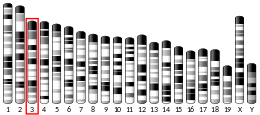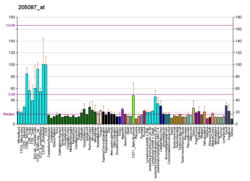RWDD3
RWD domain-containing protein 3 is a protein that in humans is encoded by the RWDD3 gene.[5][6]
References
- 1 2 3 GRCh38: Ensembl release 89: ENSG00000122481 - Ensembl, May 2017
- 1 2 3 GRCm38: Ensembl release 89: ENSMUSG00000028133 - Ensembl, May 2017
- ↑ "Human PubMed Reference:".
- ↑ "Mouse PubMed Reference:".
- ↑ Wiemann S, Weil B, Wellenreuther R, Gassenhuber J, Glassl S, Ansorge W, Bocher M, Blocker H, Bauersachs S, Blum H, Lauber J, Dusterhoft A, Beyer A, Kohrer K, Strack N, Mewes HW, Ottenwalder B, Obermaier B, Tampe J, Heubner D, Wambutt R, Korn B, Klein M, Poustka A (Mar 2001). "Toward a catalog of human genes and proteins: sequencing and analysis of 500 novel complete protein coding human cDNAs". Genome Res. 11 (3): 422–35. PMC 311072
 . PMID 11230166. doi:10.1101/gr.GR1547R.
. PMID 11230166. doi:10.1101/gr.GR1547R. - ↑ "Entrez Gene: RWDD3 RWD domain containing 3".
Further reading
- Carbia-Nagashima A, Gerez J, Perez-Castro C, et al. (2008). "RSUME, a small RWD-containing protein, enhances SUMO conjugation and stabilizes HIF-1alpha during hypoxia.". Cell. 131 (2): 309–23. PMID 17956732. doi:10.1016/j.cell.2007.07.044.
- Gregory SG, Barlow KF, McLay KE, et al. (2006). "The DNA sequence and biological annotation of human chromosome 1.". Nature. 441 (7091): 315–21. PMID 16710414. doi:10.1038/nature04727.
- Mehrle A, Rosenfelder H, Schupp I, et al. (2006). "The LIFEdb database in 2006.". Nucleic Acids Res. 34 (Database issue): D415–8. PMC 1347501
 . PMID 16381901. doi:10.1093/nar/gkj139.
. PMID 16381901. doi:10.1093/nar/gkj139.
- Wiemann S, Arlt D, Huber W, et al. (2004). "From ORFeome to biology: a functional genomics pipeline.". Genome Res. 14 (10B): 2136–44. PMC 528930
 . PMID 15489336. doi:10.1101/gr.2576704.
. PMID 15489336. doi:10.1101/gr.2576704.
- Gerhard DS, Wagner L, Feingold EA, et al. (2004). "The status, quality, and expansion of the NIH full-length cDNA project: the Mammalian Gene Collection (MGC).". Genome Res. 14 (10B): 2121–7. PMC 528928
 . PMID 15489334. doi:10.1101/gr.2596504.
. PMID 15489334. doi:10.1101/gr.2596504.
- Strausberg RL, Feingold EA, Grouse LH, et al. (2003). "Generation and initial analysis of more than 15,000 full-length human and mouse cDNA sequences.". Proc. Natl. Acad. Sci. U.S.A. 99 (26): 16899–903. PMC 139241
 . PMID 12477932. doi:10.1073/pnas.242603899.
. PMID 12477932. doi:10.1073/pnas.242603899.
- Hartley JL, Temple GF, Brasch MA (2001). "DNA cloning using in vitro site-specific recombination.". Genome Res. 10 (11): 1788–95. PMC 310948
 . PMID 11076863. doi:10.1101/gr.143000.
. PMID 11076863. doi:10.1101/gr.143000.
- Adams MD, Kerlavage AR, Fleischmann RD, et al. (1995). "Initial assessment of human gene diversity and expression patterns based upon 83 million nucleotides of cDNA sequence." (PDF). Nature. 377 (6547 Suppl): 3–174. PMID 7566098.
 . PMID 11230166. doi:10.1101/gr.GR1547R.
. PMID 11230166. doi:10.1101/gr.GR1547R. . PMID 16381901. doi:10.1093/nar/gkj139.
. PMID 16381901. doi:10.1093/nar/gkj139. . PMID 15489336. doi:10.1101/gr.2576704.
. PMID 15489336. doi:10.1101/gr.2576704. . PMID 15489334. doi:10.1101/gr.2596504.
. PMID 15489334. doi:10.1101/gr.2596504. . PMID 12477932. doi:10.1073/pnas.242603899.
. PMID 12477932. doi:10.1073/pnas.242603899. . PMID 11076863. doi:10.1101/gr.143000.
. PMID 11076863. doi:10.1101/gr.143000.



